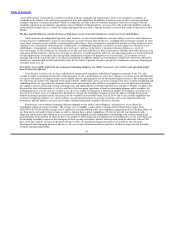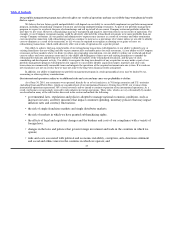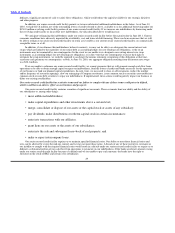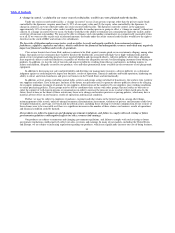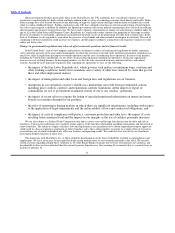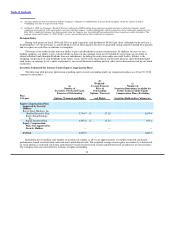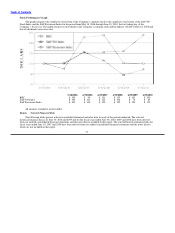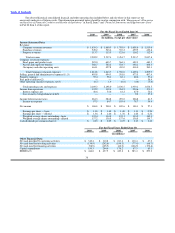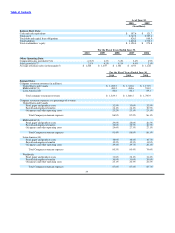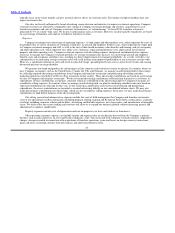Burger King 2010 Annual Report Download - page 35
Download and view the complete annual report
Please find page 35 of the 2010 Burger King annual report below. You can navigate through the pages in the report by either clicking on the pages listed below, or by using the keyword search tool below to find specific information within the annual report.
Table of Contents
technology systems are vulnerable to damage, disability or failures due to physical theft, fire, power loss, telecommunications failure or
other catastrophic events, as well as from internal and external security breaches, denial of service attacks, viruses, worms and other
disruptive problems caused by hackers. If our technology systems were to fail, and we were unable to recover in a timely way, we could
experience an interruption in our operations which could have a material adverse effect on our financial condition and results of
operations. Furthermore, to the extent that some our worldwide reporting systems require or rely on manual processes, it could increase
the risk of a breach.
In addition, a number of our systems and processes are not fully integrated worldwide and, as a result, require us to manually
estimate and consolidate certain information that we use to manage our business. To the extent that we are not able to obtain
transparency into our operations from our systems, it could impair the ability of our management to react quickly to changes in the
business or economic environment.
Our current principal stockholders own a significant amount of our common stock and have certain contractual rights to appoint
directors, which will allow them to significantly influence all matters requiring shareholder approval.
The private equity funds controlled by the Sponsors beneficially own approximately 31% of our outstanding common stock. In
addition, three of our 10 directors are representatives of the private equity funds controlled by the Sponsors, although each Sponsor
retains the right to nominate two directors, subject to reduction and elimination based on their respective stock ownership percentage. In
addition, with respect to each committee of our board other than the audit committee, each Sponsor has the right to appoint at least one
director to each committee, for Sponsor directors to constitute a majority of the membership of each committee (subject to NYSE
requirements) and for the chairman of each committee to be a Sponsor director until the private equity funds controlled by the Sponsors
collectively own less than 30% of our outstanding common stock. As a result of these contractual rights, the Sponsors will continue to
have significant influence over many of our corporate actions or our decision to enter into any corporate transaction. Furthermore, such
concentration of voting power could have the effect of influencing or preventing a change of control or other business combination or
any other transaction that requires the approval of stockholders, regardless of whether or not other stockholders believe that such
transaction is in their own best interests.
Your percentage ownership in us may be diluted by future issuances of capital stock, which could reduce your influence over
matters on which stockholders vote.
Our board of directors has the authority, without action or vote of our stockholders, to issue all or any part of our authorized but
unissued shares of common stock, including shares issuable upon the exercise of options, or shares of our authorized but unissued
preferred stock, subject to NYSE requirements. Our board also has the authority to issue debt convertible into shares of common stock.
Issuances of common stock, voting preferred stock or convertible debt could reduce your influence over matters on which our
stockholders vote, and, in the case of issuances of preferred stock, would likely result in your interest in us being subject to the prior
rights of holders of that preferred stock.
Provisions in our certificate of incorporation could make it more difficult for a third party to acquire us and could discourage a
takeover and adversely affect existing stockholders.
Our certificate of incorporation authorizes our board of directors to issue up to 10,000,000 preferred shares and to determine the
powers, preferences, privileges, rights, including voting rights, qualifications, limitations and restrictions on those shares, without any
further vote or action by our stockholders. The rights of the holders of our common stock will be subject to, and may be adversely
affected by, the rights of the holders of any preferred shares that may be issued in the future. The issuance of preferred shares could
have the effect of delaying, deterring or preventing a change in control and could adversely affect the voting power or economic value
of your shares.
Item 1B. Unresolved Staff Comments
None.
33



